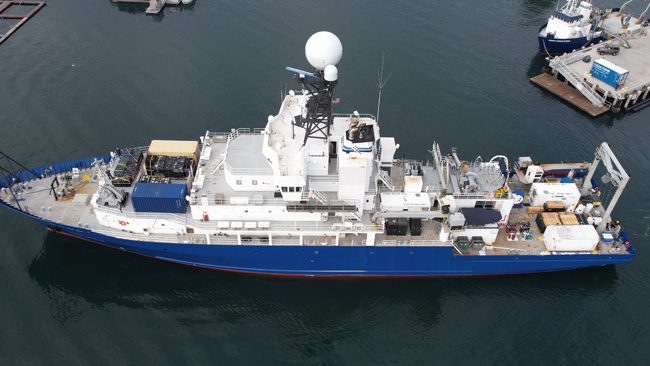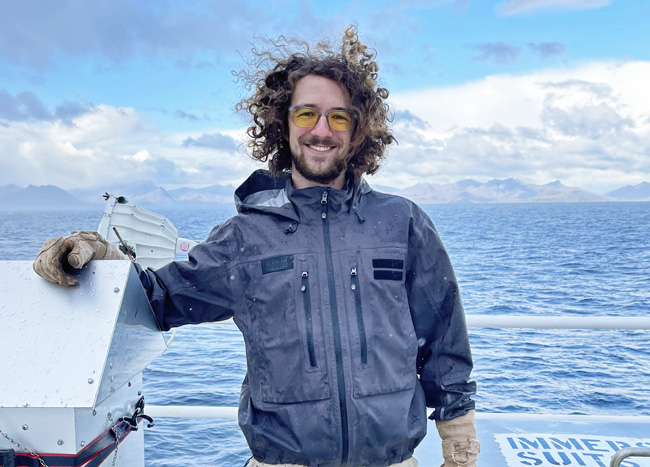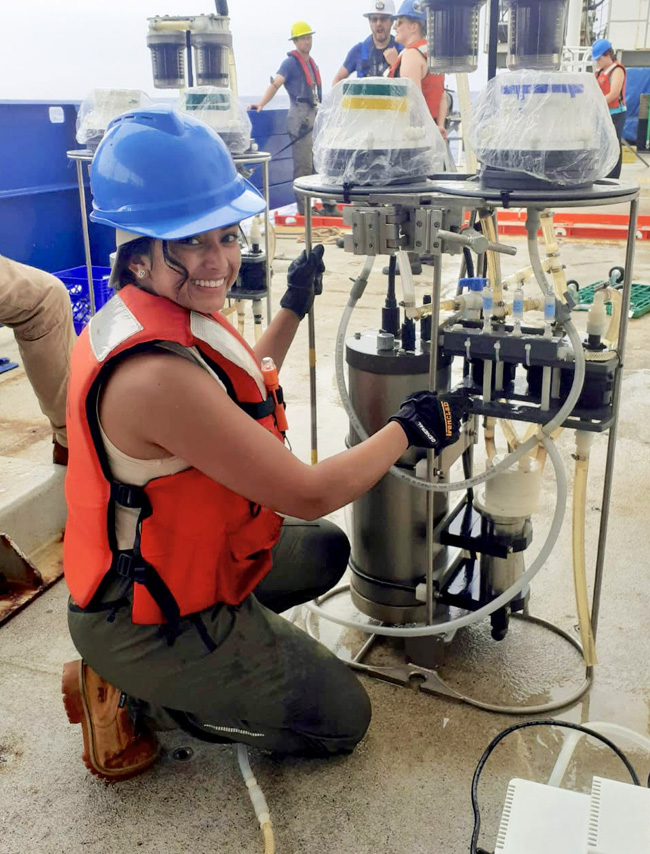While most others were preparing for the holidays in November 2022, University of Georgia and Skidaway Institute of Oceanography graduate students Michael Sheridan and Mariah Ricci were preparing for a research cruise that would take them and Skidaway scientist Dan Ohnemus from the South Pacific Ocean to the Southern Ocean and finally to Chile.
The cruise was part of GEOTRACES, an international program that aims to improve understanding of biogeochemical cycles and large-scale distribution of trace elements in the marine environment. The Skidaway team boarded Scripps Institute of Oceanography’s Research Vessel Roger Revelle in Tahiti on Dec. 1 and came ashore at Punta Arenas, Chile, 56 days later.

The Research Vessel Roger Revelle / Courtesy Scripps Institute of Oceanography
The ship travelled as far as 67 degrees south latitude, which is below the Antarctic Circle. Although the cruise took place during the Southern Hemisphere’s summer, both Sheridan and Ricci described it as an exciting but difficult trip.
“It was especially true in the Southern Ocean,” Sheridan said. “There’s a wind-driven current that goes around the entire globe because there is no land mass to block it. You get rough seas, and we hit a lot of that.”
Sheridan is a first-year master’s student working in Clifton Buck’s lab. He graduated from the University of Miami with a degree in chemistry. At sea, he worked mostly on his own, collecting atmospheric samples. He operated bow-mounted suction pumps that collected air samples and filtered out particles of dust and other materials that would otherwise be deposited in the ocean.

Michael Sheridan
“No one else from my lab was on board the ship, and that was a fantastic opportunity my advisor, Dr. Buck, gave me,” he said. “He must have trusted me quite a bit, and I hope I did a good job for him.”
Ricci was part of a two-person team from Skidaway along with Ohnemus, her faculty advisor. She is a third-year Ph.D. student who came to Skidaway Institute after graduating from the College of St. Scholastica in Minnesota. Her job was to collect and filter water samples from various depths to analyze for tiny particles and their chemical makeup. The pair stayed very busy, with the ship stopping frequently to allow scientists to collect samples. The around-the-clock schedule presented physical and mental challenges to the multi-institutional particle-sampling team, especially for someone sailing on their first long expedition.

Mariah Ricci working on a collection pump
“I didn’t realize the amount of work it takes to do the science we do,” she said. “It was a great experience just to be able to be there from start to finish.”
Their collection pumps would usually stay in the water for four hours, which gave Ricci and Ohnemus time to rest. Once the samples were on board, they immediately began processing and preserving.
“We were one of the main sampling parameters for GEOTRACES,” she said. “We were collecting samples for a bunch of different groups, so we had to cut the filters and package them or process them accordingly for different groups.”
Frequently, they barely finished processing one set of samples before it was time for another station.
It being summer in the Southern Hemisphere, when the ship approached the Antarctic circle, they experienced 24 hours of daylight.
“It never gets dark so it’s difficult to have a firm grasp of time when you are aboard ship,” Sheridan said. “And your operations are the same every day. No holidays. It’s pretty much a 24/7 schedule.”
Sheridan said he spent most of what free hours he did have working out on a rowing machine in the ship’s exercise room.
Both the students described the experience as unlike anything else they have done.
“Even with the challenges, the cruise was a wonderful opportunity, and I was able to see some unique and remote regions of the world,” Ricci said.
“It was a really hard cruise to be on, especially like for my first long cruise, but it was so worth it,” Sheridan said. “All my other cruises are going to seem that much easier because this was such a difficult one.”
Ohnemus, who has sailed on GEOTRACES expeditions in several ocean basins, agreed. “The weather, seas and equipment problems we faced were the most challenging I’ve seen in my career,” he said. “This was a real trial by fire for both graduate students—trial by fire, wind and ice, actually! They both did very well.”



One comment on “Grad students experience epic cruise”